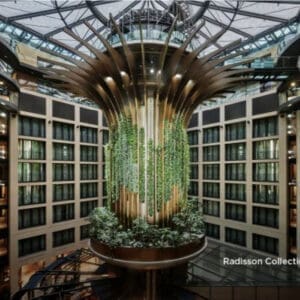 Hotel investors spent $27.8 billion on property acquisitions and developments during 2014, according to the Hotel Transaction Almanac and the Hotel Development Almanac compiled by STR Analytics. During the year, $18.5 billion in hotels changed hands while another $9.3 billion in new hotel projects opened their doors.
Hotel investors spent $27.8 billion on property acquisitions and developments during 2014, according to the Hotel Transaction Almanac and the Hotel Development Almanac compiled by STR Analytics. During the year, $18.5 billion in hotels changed hands while another $9.3 billion in new hotel projects opened their doors.
“Hotel real estate remains very attractive to investors,” said Steve Hennis, director at STR Analytics. “Strong fundamentals in recent years, specifically robust demand levels and manageable supply growth, have created a very appealing environment for hotel industry stakeholders.”
The Westin Diplomat in Hollywood, Florida, garnered the highest acquisition price last year at $535 million. The most expensive development project was the Marriott Marquis Washington, D.C., which cost $520 million.
The average price per room for acquisitions rose to $219,000, a 15.3-percent increase over 2013. The total investment for acquisitions, which includes additional capital for property-improvement-plan requirements, deferred maintenance and repositioning, increased to $249,000 per room. For new hotel projects, the average cost of construction in 2014 was $186,000 per room, illustrating the premium buyers are paying for established, cash-flowing assets.
“We have reached a point in the real estate cycle where high prices are making many investors shift their focus to new construction in order to grow their portfolios,” Hennis said. “STR’s pipeline shows more than 90,000 new hotel rooms slated to enter the market in 2015, a 50-percent increase over the 63,000 rooms that opened in 2014.”
Some key findings from the 2015 Hotel Development Almanac and the 2015 Hotel Transaction Almanac:
- Surprisingly, two of the strongest hotel markets in the U.S. experienced no new hotel openings in 2014: Boston, Massachusetts, and San Francisco, California.
- The growth of the oil and gas industry has driven the growth of hotel rooms in many rural communities in the Central U.S., accounting for 27.3 percent of the new room supply in 2014. Over the past three years, more than 36,000 hotel rooms have been constructed in areas reliant on the energy sector.
- Developers continue to focus on projects in the Upper Midscale and Upscale segments, which accounted for 75 percent of the new hotel rooms last year.
- The average cap rate on acquisitions fell to 8.2 percent, the lowest point on record. The previous low for average cap rate was 8.3 percent in 2005.
- The volume of distressed sales fell back to a normal level in 2014, with only 4.0 percent of hotel trades involving a struggling asset. In 2011, 31.0 percent of hotel transactions involved distressed assets.
The Hotel Transaction Almanac is an overview of historical trends in U.S. deal volume and pricing. It includes aggregate breakdowns by region, property class and location type for numerous key metrics. The Hotel Transaction Almanac combines STR Analytics’ in-house transaction database with that of data partner Hotel Brokers International (HBI) to create a comprehensive hotel transactions report. The report also includes valuation parameters including price per key, room revenue multiplier, additional capital invested, cap rate and financial terms including interest rates and loan-to-value ratios.
The Hotel Development Almanac is an overview of historical trends in U.S. hotel projects and their development costs. It includes a complete list of all hotels that opened in 2014 as well as aggregate breakdowns by region, property class and location type for numerous key metrics. The Hotel Development Almanac combines information from STR’s Census and Pipeline databases to create a comprehensive hotel development report.
To order the Hotel Transaction Almanac and the Hotel Development Almanac visit www.str.com















